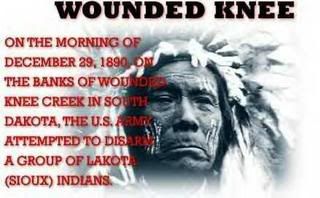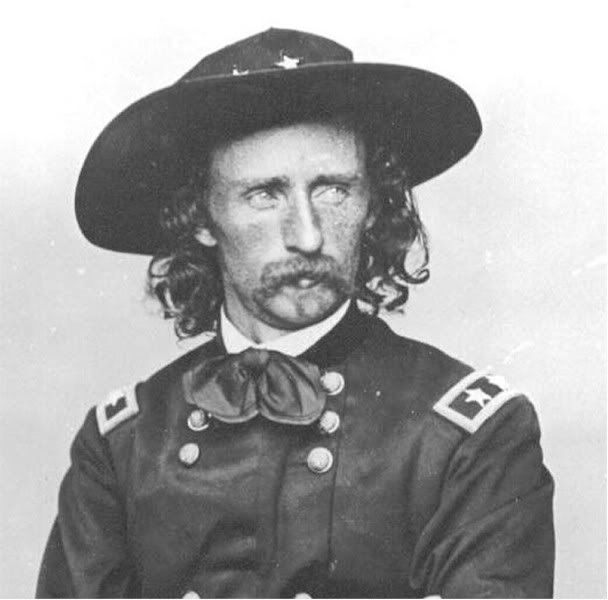The Sand Creek Massacre and the Washita Massacre both led to the Wounded Knee Massacre. The Sand Creek Massacre brought the realization that “the soldiers were destroying everything Cheyenne – the land, the buffalo, and the people themselves,” and the Washita Massacre added even more genocidal evidence to those facts. The Sand Creek Massacre caused the Cheyenne to put away their old grievances with the Sioux and join them in defending their lives against the U.S. extermination policy. The Washita Massacre did that even more so. After putting the Wounded Knee Massacre briefly into historical perspective, we’ll focus solely on the Wounded Knee Massacre itself for the 120th Anniversary of the Wounded Knee Massacre.
Tag: Washita Massacre
Dec 20 2009
The Wounded Knee Massacre: 119th Anniversary
The Sand Creek Massacre and the Washita Massacre both led to the Wounded Knee Massacre. The Sand Creek Massacre brought the realization that “the soldiers were destroying everything Cheyenne – the land, the buffalo, and the people themselves,” and the Washita Massacre added even more genocidal evidence to those facts. The Sand Creek Massacre caused the Cheyenne to put away their old grievances with the Sioux and join them in defending their lives against the U.S. extermination policy. The Washita Massacre did that even more so. After putting the Wounded Knee Massacre briefly into historical perspective, we’ll focus solely on the Wounded Knee Massacre itself for the 119th Anniversary of the Wounded Knee Massacre.
Dec 11 2008
The Wounded Knee Massacre: 118th Anniversary
The Sand Creek Massacre and the Washita Massacre both led to the Wounded Knee Massacre. The Sand Creek Massacre brought the realization that “the soldiers were destroying everything Cheyenne – the land, the buffalo, and the people themselves,” and the Washita Massacre added even more genocidal evidence to those facts. The Sand Creek Massacre caused the Cheyenne to put away their old grievances with the Sioux and join them in defending their lives against the U.S. extermination policy. The Washita Massacre did that even more so. After putting the Wounded Knee Massacre briefly into historical perspective, we’ll focus solely on the Wounded Knee Massacre itself for the 118th Anniversary of the Wounded Knee Massacre.
Jun 26 2008
Custer & the Abandonment of Major Elliot
Was losing Major Elliot’s strategic location during the extermination of the Southern Cheyenne Arapaho at Washita by Lieutenant Colonel Custer acceptable by U.S. military standards? Captain Benteen thought not.
“Surely some search will be made for our missing comrades” mocked Benteen’s piece, before concluding, “No, they are forgotten.”
Custer picked the wrong man to threaten horsewhipping.
Jun 07 2008
Exposing Revisionist History: Washita Massacre w/ Modern Implications
Since some have questioned the validity of the Police Brutality against Longest Walkers in Ohio, perhaps a little history review is in order. Who is innocent and who is guilty? Which side of the story is predominantly told and why? These are questions needing to be asked, for the devastating effects of genocide are still alive today.
Attempts to revise history are abundant in this video.
The soldiers never explained to the government when an Indian was wronged, but reported the misdeeds of the Indians.
And especially having “never explained to the government when an Indian was wronged,” was Custer. Distrubing is the fact that some people still try to spread his lies after 140 years.
Dec 28 2007
117th Anniversary of the Wounded Knee Massacre
The Sand Creek Massacre and the Washita Massacre both led to the Wounded Knee Massacre. The Sand Creek Massacre brought the realization that “the soldiers were destroying everything Cheyenne – the land, the buffalo, and the people themselves,” and the Washita Massacre added even more genocidal evidence to those facts. The Sand Creek Massacre caused the Cheyenne to put away their old grievances with the Sioux and join them in defending their lives against the U.S. extermination policy. The Washita Massacre did that even more so. After putting the Wounded Knee Massacre briefly into historical perspective, we’ll focus solely on the Wounded Knee Massacre itself for the 117th Anniversary of the Wounded Knee Massacre.


